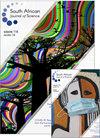通过数据驱动的方法揭示尼日利亚SARS-CoV-2大流行期间的人员流动趋势
IF 1.5
4区 综合性期刊
Q2 MULTIDISCIPLINARY SCIENCES
引用次数: 0
摘要
我们采用了新兴的基于智能手机的位置数据,并以尼日利亚为应用网站进行了日常人类移动测量。开发了一个数据驱动的分析框架,用于使用经验证的位置智能和数据挖掘算法严格制定此类措施。我们的研究展示了严重急性呼吸系统综合征冠状病毒2型大流行开始时的框架,并成功量化了人类应对这一前所未有的公共卫生事件的流动模式和趋势。该文件的另一个亮点是对流动限制政策的有效性的评估,这是从疫情中吸取的关键教训。我们发现,旅行禁令和联邦封锁政策未能限制旅行行为,但对旅行距离产生了重大影响。本文首次尝试量化人类的日常旅行行为,如旅行行为和旅行距离,以及在疫情期间撒哈拉以南非洲的行动限制政策是如何生效的。这项研究有可能利用控制良好、公开可用的大型数据集,对撒哈拉以南非洲的人类流动性和健康进行广泛的定量研究。本文章由计算机程序翻译,如有差异,请以英文原文为准。
Revealing human mobility trends during the SARS-CoV-2 pandemic in Nigeria via a data-driven approach
We employed emerging smartphone-based location data and produced daily human mobility measurements using Nigeria as an application site. A data-driven analytical framework was developed for rigorously producing such measures using proven location intelligence and data-mining algorithms. Our study demonstrates the framework at the beginning of the SARS-CoV-2 pandemic and successfully quantifies human mobility patterns and trends in response to the unprecedented public health event. Another highlight of the paper is the assessment of the effectiveness of mobility-restricting policies as key lessons learned from the pandemic. We found that travel bans and federal lockdown policies failed to restrict trip-making behaviour, but had a significant impact on distance travelled. This paper contributes a first attempt to quantify daily human travel behaviour, such as trip-making behaviour and travelling distances, and how mobility-restricting policies took effect in sub-Saharan Africa during the pandemic. This study has the potential to enable a wide spectrum of quantitative studies on human mobility and health in sub-Saharan Africa using well-controlled, publicly available large data sets.
求助全文
通过发布文献求助,成功后即可免费获取论文全文。
去求助
来源期刊

South African Journal of Science
综合性期刊-综合性期刊
CiteScore
3.20
自引率
4.20%
发文量
131
审稿时长
1 months
期刊介绍:
The South African Journal of Science is a multidisciplinary journal published bimonthly by the Academy of Science of South Africa. Our mandate is to publish original research with an interdisciplinary or regional focus, which will interest readers from more than one discipline, and to provide a forum for discussion of news and developments in research and higher education. Authors are requested to write their papers and reports in a manner and style that is intelligible to specialists and non-specialists alike. Research contributions, which are peer reviewed, are of three kinds: Review Articles, Research Articles and Research Letters.
 求助内容:
求助内容: 应助结果提醒方式:
应助结果提醒方式:


